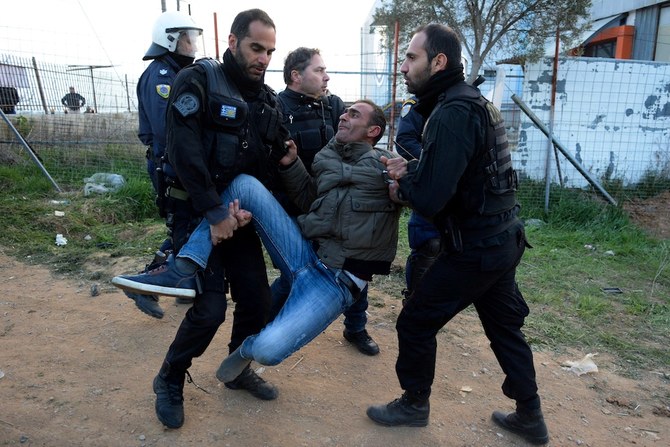Ephrem Kossaify
NEW YORK CITY: Last month, the UN observed World Refugee Day against the backdrop of a new grim milestone: The number of people who have been forced from their homes by war, persecution, violence and human rights abuses now sits at over 100 million.
This number is just one of many saddening figures from the UN refugee agency’s Global Trends report, published recently.
The report shows that five countries — Syria, Venezuela, Afghanistan, South Sudan and Myanmar — account for more than two-thirds of displaced persons globally.
People forced to move inside their own countries — known as internally displaced people (IDPs) — constitute the majority of the forcibly displaced population. Syria and Yemen, as well as Afghanistan, Ethiopia, the Republic of the Congo and Colombia, continue to host the world’s largest IDP populations.
If current conflicts remain unresolved and the eruption of new ones is not prevented, the UN report warns that the 21st century will be defined by growing numbers of people forced to flee and the increasingly limited options available to them.
Population movements around the world have become so complex in nature that aid agencies are scrambling to find new ways to deal with the continuous, massive exodus. People are fleeing not only violence, but also economic inequality as the global wealth gap continues to widen.
Changes in weather patterns and resulting droughts, floods and natural disasters have displaced more still. The food security crisis exacerbated by the war in Ukraine has now threatened a new wave.
“The nature of these flows is so complicated by now that (aid) responses have also become complicated, difficult to organize and manage, and exposed to the manipulation of unscrupulous politicians who demonize both the flows and the responses, claiming that it’s impossible (to host refugees), and therefore the real response is, as we hear in many places, ‘Shut borders and push people back’,” said Filippo Grandi, the UN high commissioner for refugees, at a recent conference attended by Arab News.
The number of displaced people worldwide has risen annually for the past 10 years, approaching 90 million by the end of 2021 — more than double the figure in 2001. Most refugees came from Syria, Venezuela and Afghanistan.
The number was also propelled by new waves of violence and conflict in countries such as Ethiopia, Burkina Faso, Nigeria and Congo.
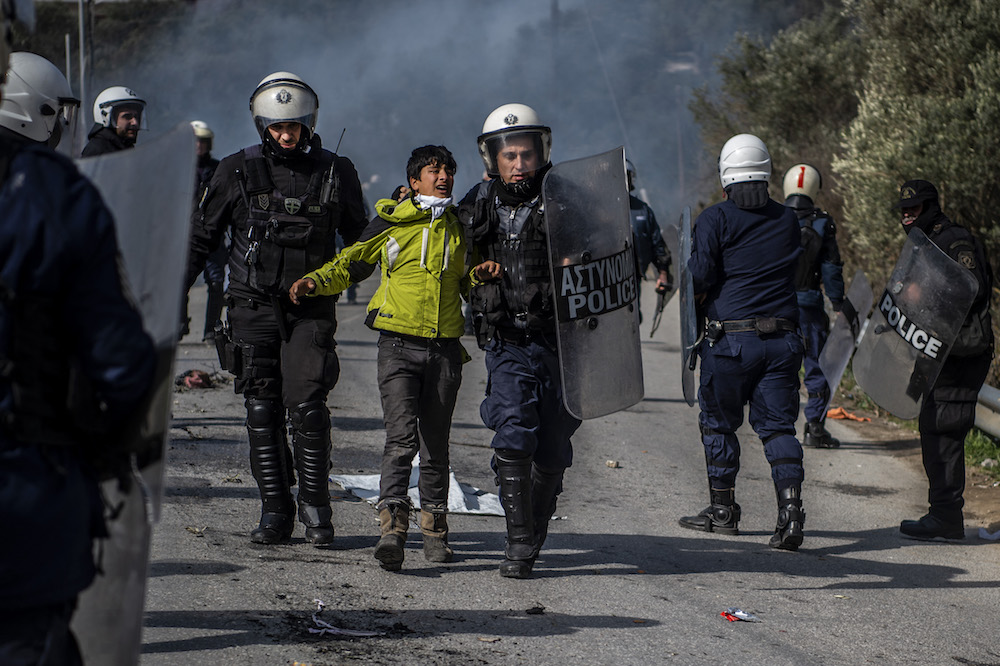
The war in Ukraine led to the fastest and one of the largest displacements since the Second World War. In just four months, nearly 7 million Ukrainians fled their country, surpassing the Syrian crisis, which over the course of 12 years has displaced over 6 million Syrians.
Grandi has hailed the “fairly extraordinary” humanitarian response to the conflict in Ukraine. However, the Italian humanitarian, who began his current role at the peak of the Syrian refugee crisis in 2016, lamented the difference in international response between the two conflicts.
“If you get well-funded in Ukraine or in Poland or in the EU, that’s not the same for many other situations. We have Ethiopia at the end of 2020 and through 2021. We had the Afghanistan situation in the summer of last year,” Grandi said, adding that crises in Syria, South Sudan and Palestine have added to the swelling number of refugees.
“From Bangladesh to Colombia, we have a dozen operations where I am very worried about the underfunding,” he said. “It is important to hammer and hammer the message (home) that Ukraine cannot be the only humanitarian response.”
When in 2015, droves of desperate Syrian refugees fleeing battles in Aleppo showed up at Europe’s doors, Grandi said that European leaders told him: “It’s full. We can’t take anybody anymore.”
“A boat of 40 or so arrives in Sicily and (leaders) are bickering on the phone over who takes how many and for how long,” he said. “And now all of a sudden, how is it possible that in six weeks, 7 million people come in and they’re taken in? There have been problems but by and large, they have been taken in generously, effectively and with protection.”
“Now I am not naïve,” Grandi said, “I fully understand the context. I understand that it may not always be like this. But it certainly proves an important point: That responding to refugee influxes, to the arrival of desperate people at the shore or borders of rich countries, is not unmanageable. It is actually efficiently manageable, but there must be political will.”
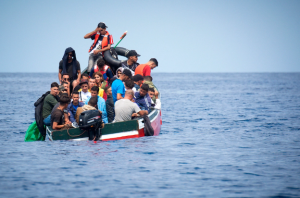
Such political will toward 1.3 million Syrian asylum seekers who made it to Europe in 2015 was largely non-existent, and these refugees were often met with vitriol and hatred even from top government officials.
Viktor Orban, Hungary’s prime minister, described asylum seekers as “poison” and “Muslim invaders.”
“There is no chance — we are going to send you back. This continent will not be your homeland, you have your own homeland. This is our homeland, we built it,” Orban said in 2015.
Also in 2015, Marine Le Pen, the far-right French politician, compared the influx of refugees to the barbarian invasion of Rome, British Pre Minister David Cameron referred to the fleeing refugees as a “swarm,” and then-Polish Prime Minister Jarosław Kaczyński accused migrants of carrying diseases.
This attitude toward refugees and migrants was not abandoned in 2015. In 2020, Matteo Salvini, former Italian deputy prime minister, claimed that African migrants were bringing diseases such as tuberculosis and scabies to Italy. However, during a Facebook livestream in March this year, Salvini pledged to transport Ukrainian refugees to Italy.
Grandi said: “Of course if you hammer into public opinion that people coming in will steal your jobs, threaten your security and destroy your values, public opinion will not turn positively toward the (incoming migrants).”
The fact that European leaders have not used such rhetoric against Ukrainians has positively predisposed public opinion toward those who came in looking for refuge, said Grandi.
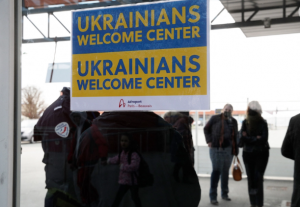
“That’s the attitude: Be constructive. Convey the message that politicians have conveyed about Ukrainians: That these are people in need.
“People flee because they are afraid. It’s not just Ukrainians. The Syrians have fled bombs. People in Tigray have fled bombs, people in the Sahel flee either bombs or vicious attacks. Fleeing from insecurity is the same whether you are a Ukrainian or a Nicaraguan. And I think it is important to continue to convey that message.”
The UNHCR report has dispelled common perceptions that the refugee crises only affect rich nations, or what is commonly known as the global north. In fact, more than 80 percent of refugees worldwide have fled to poor and middle-income countries.
“Nobody has heard of the 150,000 Nicaraguans hosted by Costa Rica,” said Grandi. “And yet, it’s a big problem for Costa Rica.”
Many Western nations see refugee crises as a problem they are not obligated to solve, even as many of the solutions are now contingent upon agreement between the West and Russia, whose diplomatic engagement, as a result of the war in Ukraine, has all but come to a grinding halt.
“The scars on international cooperation of those fractures between the West and Russia, between the major powers in the Security Council, is such that it will take a long time to heal. And yet if that is not healed, I don’t know how we will deal with these global crises,” said Grandi.
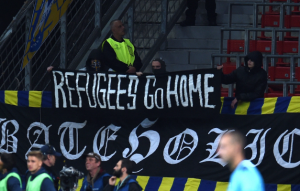
The preamble of the UN’s 1951 Refugee Convention defines a refugee as someone who “no longer enjoys the protection and assistance” of their own country, and are therefore the responsibility of the international community as a whole.
“The interesting thing,” said Grandi, “is that donors understand very well that there cannot be inequity in the response.”
Perhaps no other recent example illustrates this abdication of responsibility on the part of the West as much as Britain’s “Rwanda Plan,” a scheme that seeks to fly everyone who crosses the English Channel without authorization to Rwanda for processing.
According to the plan, the UK will pay into a Rwandan government “economic transformation and integration fund” and will fund each immigrant for their relocation and temporary accommodation.
“We are not supporting this deal,” said Grandi. “This is all wrong (and) in such contrast with the generosity displayed to the Ukrainians.
“It is the foundation of the right to asylum that people that are on a country’s territory (receive protection), especially if that country is signatory to the convention and has the institutions to deal with (asylum seekers). To export that responsibility to another country runs counter to any notion of international responsibility-sharing.”
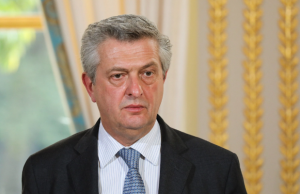
He added: “The UK says we’re doing this to save people from dangerous journeys. Let me doubt that a little bit. Saving people from a dangerous journey is great. But is that the real motivation for this deal to happen? I don’t think so. But I think if really the UK and other countries wanted these dangerous journeys to stop, then there are other ways to do it.”
Grandi said the scheme is a “new ball game that is being superimposed on Rwanda,” a country that, despite having taken in tens of thousands of Congolese and Burundian refugees, does not have the structures to conduct refugee status determination — structures that are well in place in England.
“I made this clear to Priti Patel: This deal makes our work very difficult,” said Grandi, referring to the British home secretary. “The precedent this is setting is catastrophic.”
Asked whether the global food security crisis now underway was likely to push more people to leave their homes, Grandi said he “could not imagine how” it could be otherwise.
He concluded that although he is calling on the world to help with the consequences of conflict, “the problem has to be solved at the root and the war has to be stopped. Negotiations have to resume.”



